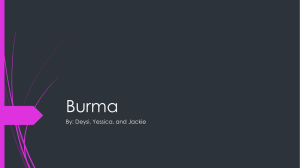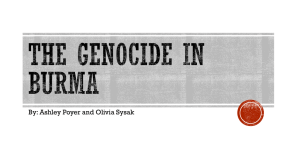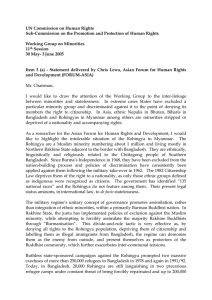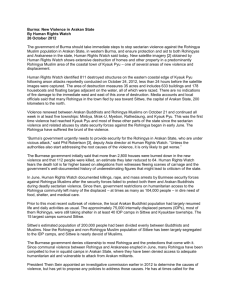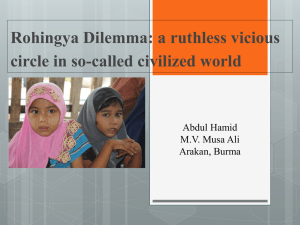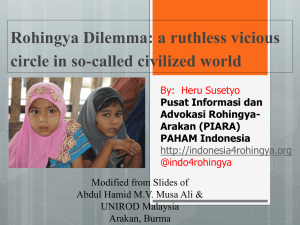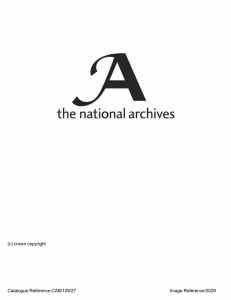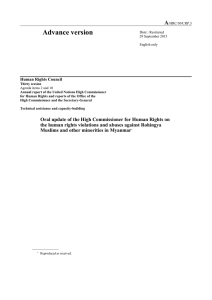The Burma Genocide By: Jacob Helmann and Andrew Will
advertisement
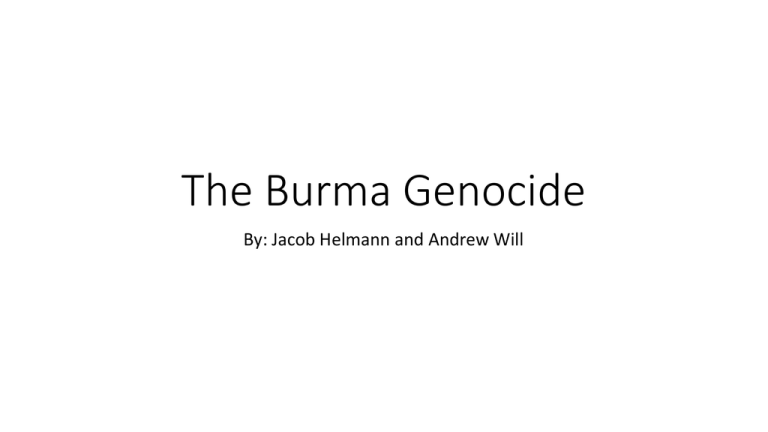
The Burma Genocide By: Jacob Helmann and Andrew Will Causes • The military regime in Burma is one of the world’s most aggressive and violent governments. • The Muslim Rohingya are a small group of people that face serious abuse from the government. • The main motive for the abuse is the goal of achieving “ethnic cleansing”. How it started • Burma’s 1982 citizenship law does not include Rohingya in the list of recognized ethnicities. • The government insists that the Rohingya people are all illegal immigrants, even though they have lived in Burma since 1948. • They live in the Rakhine State Conflict • The government of Burma limits their right to marry and have children. • Rohingya must obtain permission to marry, and usually are not pemitted to have more than two children. • Some Rogingya people disobey this law, and a result their children are considered “invalid” and are denied access to all government services, continuing the cycle. Containment • The Rohingya are essentially contained and locked into their current region. • Applications must be complete to leave the city, and the government makes it near-impossible to obtain them. Slavery • The majority of the Rohingya are required to work without pay for the government or military, with many of these workers being children. • Many Rohingya that try to escape are quickly captured by human traffickers and are sent either to plantations or sex-slavery. Police Corruption • Rohingya are always at risk of having property confiscated, arbitrary arrest and detention. • Additionally, they are constantly physically and sexually abused, sometimes even tortured, by the authorities. Segregation • Rohingya are barred from the teaching, medical, and engineering professions. • Many health care facilities will not treat them and few businesses will hire them other than for manual labor. Dates • Starting in 1948, the Rohingya people have been persecuted. • In 1982, a new citizenship law was passed that classified them as illegal immigrants, which essentially gave approval to the genocide. • The worst violence came in 2012, when hundreds were killed and more than 140,000 were displaced Resolution • Unfortunately, the Rohingya people are still being abused to this day. • There have been improvements recently towards improving humanitarian access, but the citizenship law has not been changed. Awareness and Support • I will never commit a hate crime. • We are all equal, so I will give my full support to all those being harmed. • I will stay aware and informed to help prevent any other genocides from happening. Bibliography • http://www.ushmm.org/confront-genocide/cases/burma • http://endgenocide.org/conflict-areas/burma-backgrounder/ • http://worldwithoutgenocide.org/genocides-and-conflicts/burma • http://www.gettyimages.com/detail/news-photo/young-rohingya-working-at-the-coxs-bazar-fishing-port-the-news-photo/175103304 • http://carefugees.org/2014/06/07/the-plight-of-rohingyas/ • http://www.voanews.com/content/few-rohingya-want-new-myanmar-idenitification-cards/2859878.html • http://www.aljazeera.com/news/2015/03/myanmar-police-crack-student-protesters-150310123609713.html • http://worldwithoutgenocide.org/events-and-programs/upcoming-events/january-28-burma-a-genocide-warning-today

